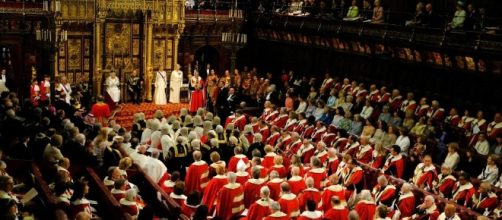This week a Lords committee report suggested that newly-created life peers ought to serve for #15-year terms in an effort to reduce the size of the #House Of Lords. Previous initiatives, including allowing a lord to step down from the House, have failed to produce the sorts of numbers that the government would like to see. We now have an upper house composed of 800 members, far more than can fit into the chamber itself, second only to the Chinese National People's Congress. This proposal may work to reduce the membership if that is really as important as some maintain, but it will not solve the problem that the House of Lords has been packed full of hypocrites, expenses-hungry toadies, place-fillers and donors.
I do not expect this Conservative government to try to conserve anything, but perhaps some more people might lament what we have lost.
You never know what you've got
Before the advent of life peerages in 1958, this was not so much of a problem. It has only gotten worse since New Labour's reforms were implemented. It was supposed to be a compromise to appease all concerned, but as with all such things, no one is really content with this bodged job of a Not Supreme Court. For hundreds of years, hereditary peerages had been created to provide Britain with a truly independent chamber of learned, wise men (and women, of course) with ancient names and huge estates, to give them true independence from any financial leverage that the government could employ.
We have not got that anymore because democratising absolutely every part of the constitution was so essential, all that remains is a rump of Hereditary Peers and a pack of people who were not especially popular with the voters and have become bought and paid for, in the words of Baroness Boothroyd, "lobby fodder".
One of the best arguments for an unelected upper chamber is that, by virtue of not being elected, its membership is able to avoid the power of the party whips which has made the debate in the House of Commons so sterile. This is true, to some extent, of life peers, but even more so of their hereditary counterparts. Those raised in the knowledge that one day they will sit on the red benches, that were made to sit on the steps and listen to grand old figures discussing the great issues of the day, are more likely to provide us with the serious debate that holds the government to account.
Life peers owe their position to the current prime minister, this means that an awful lot are loyal to that leader whilst they are in position, thereafter they tend to be slightly better than MPs at flexing their muscles against the leadership. The problem is that most life peers are professional creepers and millionaires looking for a title to add to their portfolio, exactly the sorts of people who should be kept away from that hallowed hall. How does this compare to the several times great-grandson of one of Charles II's illegitimate children? The toady, or the man of his own means that could not be pushed around by anyone in Downing Street?
We'll not see their like again
In a 2007 debate in the House of Commons about further Lords reform, Theresa May, then Shadow Leader of the House of Commons, proclaimed that the "Upper House has been a thorn in the side of this government by protecting ancient liberties".
She was right. Here was a ready-made stopper on political power, which would have been useful on the election of (I'll let you fill the gap). In fact, she would have been even better to have gone on to tell Mr Blair, as he slouched back onto the opposite green benches, that he had made things better for no one. Instead, she chose to follow her Blairite party's line of further reforming the Lords in order to "strengthen" it - what that meant was anyone's guess. Unfortunately, she has not gone on to make a positive change to strengthen this element of the Lords' jobs, in fact, she has supported the continuation of the current rotten settlement. We should not expect the party which stood aside to allow Mr Blair to take a knife to the constitution will do anything about it now.
This was the chamber that the Founding Fathers of America sought to emulate with the Senate until it too was reformed in 1913, you can decide whether the United States is a better place as a result. It should not have worked, but it did. It was full of colourful characters, not the obedient, beige, pre-selected elected MPs, who have done such a wonderful job of governing Britain. There are life peers who we would want in a hereditary chamber -Baroness Chakrabarti for instance. What took hundreds of years to grow to an almost perfect state was destroyed in minutes, I fear, forever. Perhaps the reformers are right, maybe we would be better off with a fully-elected chamber and the inevitable political deadlock that will follow. Or maybe, just maybe, our ancestors knew better than us.


